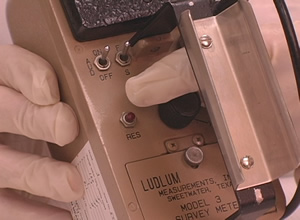Hello, Dr. Z – I’m a Radiation Safety Officer (RSO). I am putting together a training program for my radiation workers. What do I need to include to make sure I cover all the bases? Thanks!
Wow – great question! And very near and dear to my heart – I’ve been teaching in one way or another since the early 1980s. So let’s see how much I can tackle here.
First, let’s start off with who is considered to be a radiation worker. And the fact is that there is no regulatory definition of what a radiation workers is – this is something that you will have to define for yourself based on your understanding of your facility. The bottom line is that anybody who is NOT a radiation worker is limited to 100 mrem of exposure annually, so if you have anybody who you can reasonably expect to reach or exceed this level of exposure then you need to designate them as a rad worker and give them appropriate training. You might do this based on radiation dose rate measurements (if a person works for 2000 hours a year in a radiation field of 0.05 mrem/hr they’ll receive 100 mrem in a year).
Alternately, you might decide to designate everyone who works in a particular area or who performs specific tasks as a rad worker – everyone who operates an x-ray cabinet for QA/QC measurements for example, or everyone who works in a veterinary x-ray suite. Something else to consider is that some types of workers are likely never going to receive 100 mrem in a year – but they should be considered rad workers nevertheless. Think, for example, of laboratory technicians who handle radionuclides every day – even though these workers almost never receive any measureable dose at all (at most universities, anyhow) they’re working directly with radioactive materials in a form that can easily cause contamination.

OK – moving on…training is a regulatory requirement, in addition to being simple good sense. Think about it – if you’re going to ask someone to work with anything potentially hazardous, you owe it to them to teach them how to do so safely. So we have, say, electrical safety training for those working with electrical gear, we give driver’s training before we can operate vehicles…and we give radiation safety training to people before they’re allowed to work with radiation or radioactivity. And if that’s not enough of a reason for you, radiation safety regulations (specifically 10 CFR 19.12) require training for “all individuals who… are likely to receive in a year an occupational dose in excess of 100 mrem (1 mSv)….” Not only that, but all of your radiation workers are required to receive annual refresher training.
Oh – I should also point out that you might need to give training to non-radiation workers if they routinely work around radiation or radioactivity. For example – your maintenance or housekeeping staff might regularly enter radiological areas to clean up, empty the trash, or fix equipment. Even though these people might never receive any appreciable exposure they’re still working around radioactive materials and they deserve to know how to do so safely. These are called ancillary workers and of course they should receive training! Luckily, this training need not be very in-depth – mine would usually only last about 10 minutes and I’d briefly make sure they could recognize the radiation symbol, that they knew not to remove radioactive waste, I’d make sure to let them know that the health effects were minimal (given the very low exposure they were receiving), and would let them know how to get in touch with Radiation Safety or Security if they ran into any problems.

How the training (both initial and refresher) is given is not specified in the regs – I will always give the initial training in person, but I’ve found a number of ways to give the refresher training. I’ve required rad workers to watch instructional DVDs, to read the refresher training materials, I’ve had on-line refresher training, and also given annual classes. I’ll also accept (only for refresher training) certificates from related radiation training – for example, if a person attends a class on responding to radiation emergencies. Whenever possible I prefer to give all training in person, but sometimes this just isn’t possible. The bottom line is to make sure that you can document that all of your rad workers have received the training and that the training meets the regulatory requirements. As to what those requirement are…keep reading!
The same regulation mentioned earlier also tells us what has to be included in the training:
- Kept informed of the storage, transfer, or use of radiation and/or radioactive material;
- Instructed in the health protection problems associated with exposure to radiation and/or radioactive material, in precautions or procedures to minimize exposure, and in the purposes and functions of protective devices employed;
- Instructed in, and required to observe, to the extent within the workers control, the applicable provisions of Commission regulations and licenses for the protection of personnel from exposure to radiation and/or radioactive material;
- Instructed of their responsibility to report promptly to the licensee any condition which may lead to or cause a violation of Commission regulations and licenses or unnecessary exposure to radiation and/or radioactive material;
- Instructed in the appropriate response to warnings made in the event of any unusual occurrence or malfunction that may involve exposure to radiation and/or radioactive material; and
- Advised as to the radiation exposure reports which workers may request
In addition to these, you should also consider discussing program-specific topics; what these are is up to you. For example, I would include a discussion of the most common problems we found when we inspected our radiation laboratories, I’d go over a few instructive case studies, and would also show the rad workers (most of them were laboratory technicians or graduate students) how to work safely with radioactivity in their labs. Oh – and at the end of the rad worker training you should give an exam to the students to confirm that they’ve been paying attention. Typically your regulators will be looking to make sure that they receive a score of 70% or higher – anyone who can’t get this score should be required to re-take the training, hoping the information will stick a little better the second time around.
Now a few odds and ends….
- You need to keep records of everything. Students should sign in for the training (keep the sign-in sheets) and their exam grades should be recorded; these records should be kept for at least a year, until they take their refresher training (and pass the exam for that).
- You, as Radiation Safety Officer (RSO), also need to have periodic refresher training, presumably to keep you from just talking to yourself for a half hour or so every year. And since you have to have a far higher level of knowledge than any of your rad workers, you should seriously consider taking a 2-3 day class for your refresher training, but this class need not be called “RSO refresher training.” Many regulators will accept any radiation-related class you find – I’ve had RSO refresher students in classes I’ve taught on radiological terrorism, radiation instruments, Naturally-Occurring Radioactive Materials, and more.
- You might also have to receive more specialized training. For example, if you’re transporting or shipping radioactive materials then you have to receive training in this every three years. If you have (for example) an irradiator then you’ll probably have to teach people how to safely use the irradiator before they’re allowed to do so. And so forth….
- And there’s no specific requirement as to how long the training should last – I’ve been to rad worker training that lasted as little as a half hour and to training that took three full days – you’re going to have to balance what the regulations require, the site-specific materials you’d like to go over, as well as the amount of time you’re able to pry your workers away from their normal duties.
That’s about it on training – I can go into more details but, really, from here it gets to be very program-specific. I hope it helps – and good luck!